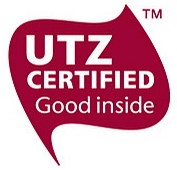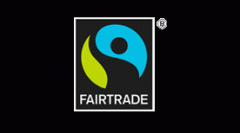General knowledge of UTZ Certified quality Coffee Certification
In Mayan language, UTZ means "quality". UTZ Certification body is an independent organization that certifies all kinds of quality coffee, tea and cocoa in the world. UTZ certification, also known as good coffee (tea / cocoa) certification, refers to the responsible coffee (tea / cocoa) mark recognized by UTZ after the production of coffee (tea / cocoa) has passed environmental, social and economic independent audit standards. UTZ certification covers every production step from coffee (tea / cocoa) cultivation to processing.
Logo:

The implementing rules for the Certification of quality Coffee (Tea / Cocoa) is a set of internationally recognized standards, including economic, social and environmental standards for responsible coffee (tea / cocoa) production. Producers who comply with these rules (plantation owners or small farmers' groups) may seek certification.
Chain of custody requirements is a set of management and technical rules that highly guarantee the source of quality certified coffee (tea / cocoa). Producers, mills, exporters, importers, warehouses, traders, processors, Packers and brands who comply with this quality Coffee (Tea / Cocoa) Certification chain may seek certification.
The UTZ certification program is based on the EurepGAP standard, which means that all UTZ certified coffee (tea / cocoa) conforms to the EurepGAP standard.
UTZ CERTIFIED said the establishment of the project was one of the main reasons for the growth in certification demand. " The Code of Coffee, Cocoa and Tea (The Codes) meets market requirements. At the same time, on those issues that most affect productivity and sustainable development, UTZ CERTIFIED is the main crux of farmers' analysis. This approach shows that corporate social responsibility can actually bring (economic) value to the environment of the country of origin and farmers as well as to companies in the country of purchase.
Strong growth in certified cocoa supply
In addition to coffee farmers, UTZ CERTIFIED also trains cocoa farmers into professionals and responsible entrepreneurs. With the continuous growth of the number of UTZ CERTIFIED-certified cocoa farmers worldwide, the supply of cocoa for sustainable production will continue to grow strongly for some time to come. Currently, cocoa producers are certified in C ô te d'Ivoire, Ghana, Papua New Guinea, Ecuador, Vietnam, Nigeria, Uganda, Congo, Peru, the Dominican Republic and Tanzania.
UTZ CERTIFIED launches Code of Conduct for Rooibos (Louis Boss Tea Code of Conduct)
In order to further promote the sustainable development of the tea industry, UTZ CERTIFIED has taken a very important step-the launch of Code of Conduct for Rooibos. This is also the first internationally recognized standard for mainstream Rooibos tea for sustainable development. Four manufacturers and two processors in the pilot project have been certified.
The independence of farmers has been enhanced.
Today, more than 160000 small growers and planters of coffee, tea and cocoa have been certified by UTZ CERTIFIED. This means that the independence of many farmers has been strengthened. Farmers have received professional training in agricultural practice and management. This not only improves the quality of products, but also enables them to achieve greater output at a lower cost. In turn, it can enable farmers to sell their high-quality products at better prices, thereby improving their living standards. In addition, farmers who work with UTZ CERTIFIED in the global market can receive a premium on crop prices and do not have to pay any fees to participate in the project.
For more information about UTZ certification bodies, please visit http://www.utzcertified.org
Important Notice :
前街咖啡 FrontStreet Coffee has moved to new addredd:
FrontStreet Coffee Address: 315,Donghua East Road,GuangZhou
Tel:020 38364473
- Prev

4C Association Coffee Certification which Coffee Certification
4C certification is a widely accepted management rule in the world, which involves the sustainable development of coffee cultivation, production, processing and other aspects of the supply chain, including social, environmental and economic principles. Coffee practitioners are required to protect biodiversity, protect all kinds of national endangered animals and plants, correctly use and handle pesticides and other chemicals, protect the natural environment and
- Next

Fair Trade Fair Trade Certification Coffee Farmer Coffee knowledge
Fairtrade coffee is mainly traded directly with local coffee farmers at a fair price. In a transparent management model and commercial form. The premise of ensuring the working environment of producers and protecting the local environment. At the same time, provide corresponding production technology and training, build bridges, schools, hospitals and other facilities. The aim is for sustainable development and poverty alleviation. Logo: yes
Related
- Beginners will see the "Coffee pull flower" guide!
- What is the difference between ice blog purified milk and ordinary milk coffee?
- Why is the Philippines the largest producer of crops in Liberia?
- For coffee extraction, should the fine powder be retained?
- How does extracted espresso fill pressed powder? How much strength does it take to press the powder?
- How to make jasmine cold extract coffee? Is the jasmine + latte good?
- Will this little toy really make the coffee taste better? How does Lily Drip affect coffee extraction?
- Will the action of slapping the filter cup also affect coffee extraction?
- What's the difference between powder-to-water ratio and powder-to-liquid ratio?
- What is the Ethiopian local species? What does it have to do with Heirloom native species?

